|
|
|
Sort Order |
|
|
|
Items / Page
|
|
|
|
|
|
|
| Srl | Item |
| 1 |
ID:
118138
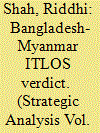

|
|
|
|
|
| Publication |
2013.
|
| Summary/Abstract |
The International Tribunal for the Law of the Sea (ITLOS) is a body set up under the United Nations Convention on the Law of the Sea (UNCLOS) to deal with disputes that emerge because of a difference in the interpretation and application of the convention. 1 Bangladesh has had an ongoing maritime boundary dispute with India and Myanmar since 1974. On 14 March 2012, the ITLOS delivered a verdict and ended the long-running maritime boundary dispute between Bangladesh and Myanmar.
In the current global world, energy resources are a crucial element for a nation's growth. India, Bangladesh and Myanmar are no different in this regard. India discovered 100 trillion cubic feet (tcf) of gas reserve in the Bay of Bengal (BoB) in 2005-2006. Soon after, Myanmar discovered seven tcf of gas reserves near the Rakhine coast. This discovery of colossal gas reserves sparked a claim-staking contest between the three countries in the BoB.
|
|
|
|
|
|
|
|
|
|
|
|
|
|
|
|
| 2 |
ID:
118140
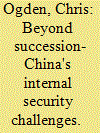

|
|
|
|
|
| Publication |
2013.
|
| Summary/Abstract |
China is undergoing a transitional period of rapid economic and social development. The way in which this period is managed will hold significant implications for the Chinese state concerning both its internal and external security. While fundamentally resting upon progressing from a developing to a developed economy, this transition highlights deep issues and tensions affecting China-ranging from rising societal inequalities to various separatism threats to mounting individualism. Regardless of internal succession struggles within the Communist Party of China (CCP), it is critical to focus upon this multitude of (mounting) social and economic issues-particularly outside of the political realm-that China's new leaders will have to face. Here, we highlight three themes central to this transition-a search for internal stability; China's multiple, interlocking internal issues; and the longevity, resilience and adaptability of the CCP-in order to assess their potential impact on China's domestic and, critically, external politics.
|
|
|
|
|
|
|
|
|
|
|
|
|
|
|
|
| 3 |
ID:
118136
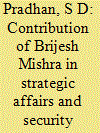

|
|
|
|
|
| Publication |
2013.
|
| Summary/Abstract |
The late Sri Brijesh Mishra's perceptive mind and pragmatism in the formulation of foreign and security policies earned him the title of 'Chanakya of the modern period'. During his long career as a diplomat, he held many important positions and retired from the Indian Foreign Services (IFS) as India's permanent representative in the United Nations (UN). He was specially chosen by Mrs Indira Gandhi in 1968 to go to China as Charge d'Affaires-an important assignment after the Sino-Indian conflict of 1962-with the specific directions that India's relations with China, which were 'in a box', needed to be changed. Sri Mishra had earlier been deputy secretary (China) during the Sino-Indian conflict. Mrs Gandhi's choice of Sri Mishra for this onerous task is itself a reflection of his capabilities. He discussed with his counterparts in China ways and means to improve relations between the two countries. While the relations did not improve during his tenure, he did succeed in changing the thinking at the top level in China. On 1 May 1970, Mao told him that the two important Asian countries should not quarrel and that they would be friends again.
|
|
|
|
|
|
|
|
|
|
|
|
|
|
|
|
| 4 |
ID:
118143
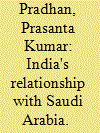

|
|
|
|
|
| Publication |
2013.
|
| Summary/Abstract |
Trade has been the dominant factor in India's relationship with Saudi Arabia, with the import of oil being a major component. India views Saudi Arabia as a country with which it can forge security ties in order to deal with terrorism, piracy and criminal elements. Diplomatically, it could be a gateway for India into the wider Arab and Islamic world. In recent years, Saudi Arabia has reciprocated India's initiatives relating to issues of mutual interest. Although some hurdles remain, it is time for both countries to work towards building a strong strategic partnership.
|
|
|
|
|
|
|
|
|
|
|
|
|
|
|
|
| 5 |
ID:
118142
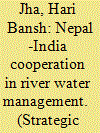

|
|
|
|
|
| Publication |
2013.
|
| Summary/Abstract |
There is a perception in certain quarters that Nepal was not given due share in the three major water deals between Nepal and India, namely the Kosi Agreement, the Gandak Treaty and the Mahakali Treaty. However, these projects were found to be mutually advantageous to both Nepal and India. If there was any shortcoming in the Kosi Agreement or the Gandak Treaty, it was due to the lack of experience on the part of India. As and when the need was felt, India reciprocated the Nepalese sentiments by way of making revisions in the treaty/agreement. It is a pity, however, that the positive dimensions of the water deal between Nepal and India have not been properly understood because of over-politicisation of the issue.
|
|
|
|
|
|
|
|
|
|
|
|
|
|
|
|
| 6 |
ID:
118139
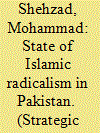

|
|
|
|
|
| Publication |
2013.
|
| Summary/Abstract |
The soil of Pakistan, because of its culture, customs, traditions, values, the temperament of the people and even state policies, provides the ideal ground for Islamic radicalism, extremism, sectarianism and terrorism. The foundation of religious bigotry and Islamic fundamentalism had been laid down in Pakistan-perhaps inadvertently-when poets like Allama Iqbal dreamt of Pakistan and the All-India Muslim League coined the term 'Two-Nation Theory' (TNT, to be read apart from an explosive that goes by the same acronym) under the leadership of Mohammad Ali Jinnah, raising the demand for a separate homeland for the Muslims of the subcontinent. At that time, the ultimate objective was to safeguard and secure the interests of the Muslim feudal lords (especially in the Muslim minority provinces of British India) and get rid of the perceived supremacy of the Hindus in a representative and democratic setup. The basic assumption that drove the demand for separation at that time was that the Muslims-namely the Shias, the Ahmadis, the Barelvis, the Ahle Hadith and the Deobandis-constituted one nation and they could not co-exist with the Hindus, the other nation.
|
|
|
|
|
|
|
|
|
|
|
|
|
|
|
|
| 7 |
ID:
118137
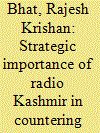

|
|
|
|
|
| Publication |
2013.
|
| Summary/Abstract |
Like any other government-owned media institution, Radio Kashmir has historically been entrusted with a mission to safeguard the territorial integrity of India and help in guarding its vital strategic interests. It acts as an agency that bridges the gap between the government and the people and creates a favourable opinion of India as a strong, modern and secular democracy in a region where fundamentalism and military ambitions have created rogue states.
European countries used the radio as a psychological weapon and a propaganda tool, particularly during World War II. Pakistan has been abusing its own medium of sound since 1947, allegedly with a motive to weaken India, and to win over the people of Jammu and Kashmir (J&K) by exploiting their religious sentiments.1 An analysis of militants' activities in J&K over the last two decades will reveal that Pakistan has been trying to woo the youth of J&K to act as an illegitimate army to bleed India 'through thousand cuts'. Although the infiltration process may be slow at the moment, the danger continues to lurk. Trade relations between India and Pakistan have improved and the two neighbours may arrive at an agreement regarding Kashmir in the days to come. However, Pakistan will continue to foment trouble in the state that it sees as an 'unfinished agenda of Partition'. The institution of Radio Kashmir will again have its tasks clearly cut out in such a changed geostrategic scenario.
|
|
|
|
|
|
|
|
|
|
|
|
|
|
|
|
| 8 |
ID:
118144
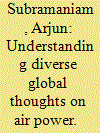

|
|
|
|
|
| Publication |
2013.
|
| Summary/Abstract |
Air power has gone through a lot over the last two decades-from being a decisive tool of war fighting during Operation Desert Storm and operations over Kosovo, to a more sobering period in the first decade of this century when it faced intense criticism over its use in Lebanon, Iraq and Af-Pak. The resilience and versatility of air power ensured that it adapted to the requirements of modern conflict, albeit a trifle slower than expected, with Operation Geronimo (the mission to eliminate Osama bin Laden) and Operation Unified Protector (the aerial campaign to facilitate the ouster of the Libyan dictator Gadaffi) being prime examples. Some air power theorists feel that practitioners of air power may have got carried away by the seductiveness of technology and precision, leading to the wrong strategic application of air power in some places. Thus, a need is felt to revisit current global air power discourse from a theoretical perspective and create a convergence of sorts between the strategist, theorist and practitioner.
|
|
|
|
|
|
|
|
|
|
|
|
|
|
|
|
| 9 |
ID:
118141
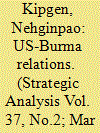

|
|
|
|
|
| Publication |
2013.
|
| Summary/Abstract |
The article analyses US-Burma relations under two different US administrations. Since the failed 1988 democracy uprising in Burma, the United States of America and the Union of Burma have had a strained relationship. This resulted in the US government's downgrading of its representative from ambassador to chargé d'affaires. The Republican administration of President George W. Bush pursued an isolationist policy by imposing sanctions on Burma from 2001 to 2009. When President Barack H. Obama took office in 2009, his Democratic administration embarked on a dual-track policy, engaging the Burmese leaders in a senior-level dialogue while continuing with sanctions. Although both the Republican and Democratic administrations pursued sanctions, the dual-track policy of the Obama administration was better received by the Burmese government. Democratic reforms within Burma played an important role in improving the bilateral relations under the Obama administration.
|
|
|
|
|
|
|
|
|
|
|
|
|
|
|
|
|
|
|
|
|